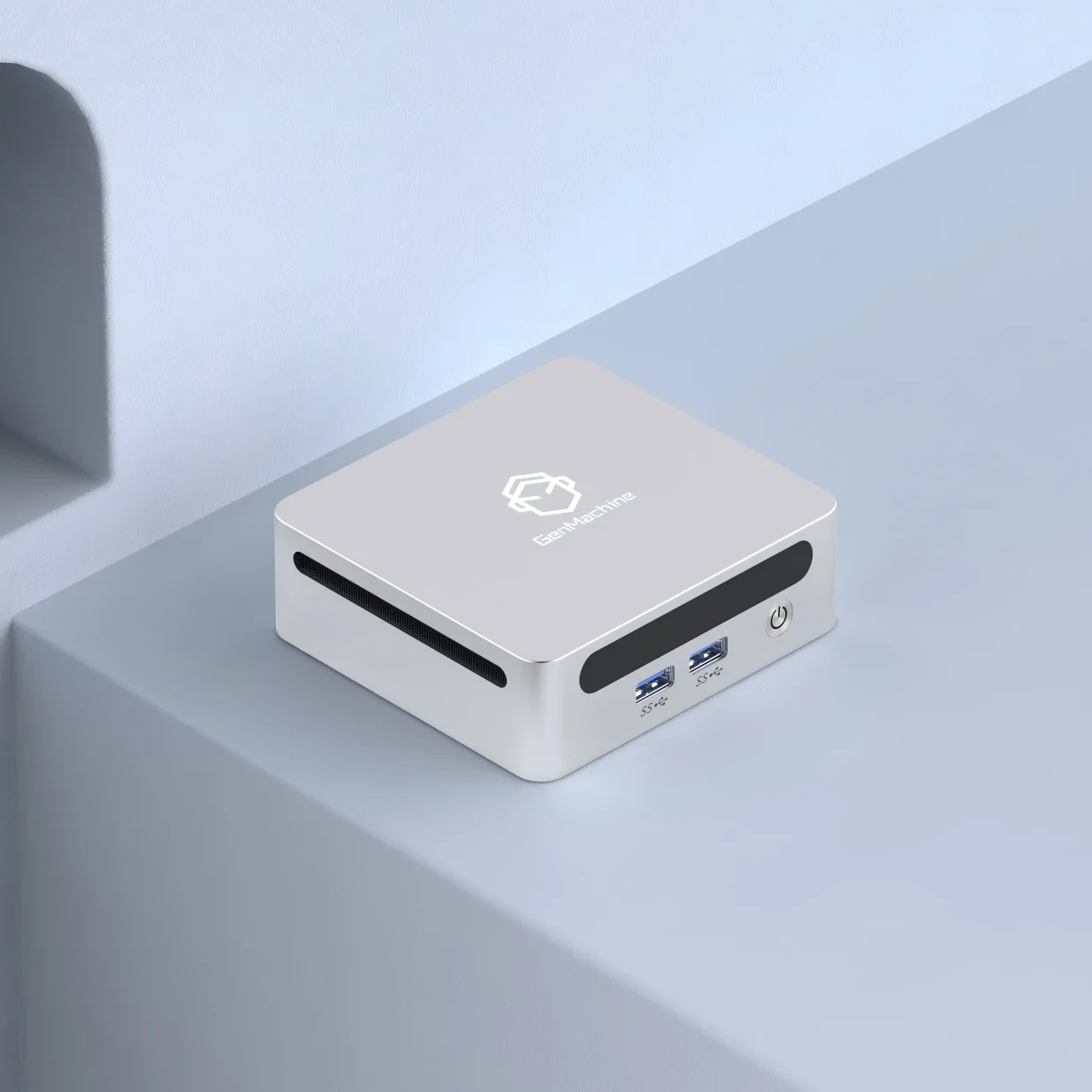In digital education, a portable yet powerful mini pc boosts students’ learning efficiency. While standard laptops are the norm, their weight and bulk still add to the daily load. With compactness, low power draw, and high cost-effectiveness, the mini pc is fast becoming the smart alternative for students. In 2025 the market is flooded with options; GenMachine lists models built precisely for student needs. Below we recommend several high-quality mini PCs and break down their core advantages.
Ⅰ. Core Needs of Students
Students use mini PCs for a variety of purposes, from daily note-taking and paper writing to online lectures, light design work, and occasional entertainment and relaxation. They all have specific requirements for performance, portability, and expandability. Only by accurately matching these needs can you choose a mini PC that truly suits you.
1. Performance: Balancing Learning and light Entertainment
Students’ day-to-day learning activities mostly involve document processing, web browsing, and online courses. It does not necessarily require top performance but should run smoothly without lags. Programming and simple video editing also need a suitable processor and graphics card. Some GenMachine models are installed with AMD Ryzen processors which deliver an excellent balance between performance and power consumption thus preventing lags during study.

2. Portability: Easily Integrate into Campus Life
Students are always on the move between classrooms, libraries, and dormitories, so portability of their device is essential. The mini PC should be small and light enough to fit into a backpack without adding much weight when traveling. For instance, the GenMachine Zhi series mini PC has dimensions of only 7.8cm × 7.8cm × 5.5cm; it is smaller than your palm hence very easy to carry around, perfectly designed for mobile learning within a campus.
3. Expandability: Addressing Different Learning Scenarios
Students in different majors have different device expandability requirements. For example, computer science students may need to connect to multiple devices, while design students may require a high-definition monitor. Most GenMachine models support memory and hard drive expansion and are equipped with multiple interfaces such as HDMI and USB, meeting students’ diverse external connectivity needs.

Ⅱ. Recommended Student Mini Pc List for 2025
Based on the above requirements, we have selected three student-friendly mini PCs from the GenMachine product line, covering various budgets and usage scenarios, providing precise choices for students.
1. Cost-Effective Choice: GenMachine Li Series Ryzen Mini PCs
The Li series mini PCs focus on high cost-performance, making them ideal for students on a budget. Their core advantages are as follows:
- Core Configuration: Taking the R7-3750H model in the Li series as an example, it uses a 12nm process, boasts 4 cores and 8 threads, and Turbo Boost speeds up to 4.0GHz. Paired with AMD Radeon Vega 10 graphics, the GPU reaches a maximum frequency of 1400MHz, making it perfectly suited for daily learning and light entertainment.
- Storage Expansion: Memory supports DDR4 2400MHz dual-channel, expandable up to 64GB. Hard drives support M.2 2280 NVME, expandable up to 2TB, meeting students’ needs for storing learning materials and courseware.
- Appearance: This series features a colorful RGB lighting design, creating an attractive aesthetic that meets students’ aesthetic needs.
2. A balanced and Practical Choice: GenMachine Ren Series Mini PC Computers
The Ren series mini PC computers offer a balance of performance and portability, making them suitable for students in most majors. Recommended reasons are as follows:
- Performance: We recommend the R7-7730U model in the Ren series. Built on a 7nm process, it features an 8-core, 16-thread design with Turbo Boost speeds up to 4.5GHz. Its AMD Radeon Vega8 GPU boasts a maximum frequency of 2000MHz, making it easy to multitask and run simple design software.
- Storage and Connectivity: Memory supports LPDDR5 6400MHz, up to 32GB, and dual M.2 interfaces are available for expansion up to 4TB. Equipped with WiFi 6 and Bluetooth 5.2, it provides stable network connectivity and more efficient online lectures and file transfers.
- Portability: Its compact size and lightweight make it easy for students to carry between classrooms, libraries, and other locations.

3. Advanced Performance: GenMachine Yi Series Mini PC
For students with higher-performance needs, such as programming and video editing, the Yi series mini PC is an ideal choice. Specific advantages include:
- Core Performance: Taking the Yi series R7-7840HS model as an example, it utilizes an advanced 4nm process, boasts 8 cores and 16 threads, and Turbo Boost speeds up to 5.1GHz. Paired with an AMD Radeon 780M graphics card with a GPU frequency of up to 2700MHz, it can run professional applications smoothly.
- Storage and Interfaces: Memory supports LPDDR5 6400MHz, up to 32GB, and the hard drive supports dual M.2 2280 NVME 4.0 interfaces for fast read and write speeds. It also features a wide range of interfaces, including USB-C 4.0 and 2.5G LAN, for excellent expandability and support for multiple external devices.
- System Compatibility: Supports Windows 10/11 Pro and is compatible with all commonly used student learning software, meeting the needs of professional learning—ensuring this ryzen mini pc and mini pc computer works seamlessly with student tools.
Ⅲ. Practical Tips for Purchasing a Mini PC
First of all, before purchasing a mini PC you should choose the model from your budget and your learning scenario. For most basic daily learning, choose an entry level model. If it’s for programming, designs and other high end applications, then you can look at the high end performance models. Secondly, you should take note of some of the main parameters. See whether or not it has DDR4 or LPDDR5 memory expansion possibilities, whether or not there is dual M.2 interfaces and common interfaces like HDMI and USB to meet the needs of storage and external connections. Last but not least verify the system compatibility and give preference to models that support Window 10/11 Pro for better performance with variety of learning software. Also check whether the product details meet power supply standards in your region (EU/US/UK/CN/AU) to avoid inconvenience.





